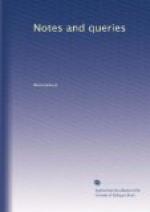Allen’s funeral was attended by myriads, and a monument was erected to his memory (which yet remains, I believe) in Newington churchyard, speaking lies in the face of the sun. If it were important enough, it deserves erasure as much as the false inscription on London’s monument.
As soon as the public blood was cool, “Mac” surrendered himself, was tried at the Old Bailey, and acquitted.
Should it be in the power of any of the readers of your interesting miscellany, by reference to the Session Papers, to give me the actual name of poor “Mac,” I shall feel obliged.
SENEX.
September 9. 1850.
[Footnote 1: Mr. Cunningham, vol. i. p. 69., gives an interesting quotation from Strype respecting Worcester House, which gave the name of “Worcester Grounds” to Mr. Kitchener’s property.]
* * * * *
Satirical poems on William iii.
Some years since I copied from a Ms. vol., compiled before 1708, the following effusions of a Jacobite poet, who seems to have been “a good hater” of King William. I have made ineffectual efforts to discover the witty author, or to ascertain if these compositions have ever been printed. My friend, in whose waste-book I found them,—a beneficed clergyman in Worcestershire, who has been several years dead,—obtained them from a college friend during the last century.
“Upon king William’s two first campagnes.
“’Twill puzzle much the author’s
brains,
That is to write your
story,
To know in which of these campagnes
You have acquired most
glory:
For when you march’d the foe
to fight,
Like Heroe, nothing
fearing,
Namur was taken in your sight,
And Mons within your
hearing.”
“On the observing the 30th of January, 1691.
“Cease, Hippocrites, to trouble
heaven
How can ye think to be forgiven
The dismall deed
you’ve done?
When to the martyr’s
sacred blood,
This very moment, if you could,
You’d sacrifice
his son.”
“On king William’s return out of Flanders.
“Rejoice, yee fops, yo’r
idoll’s come agen
To pick yo’r pocketts,
and to slay yo’r men;
Give him yo’r millions,
and his Dutch yo’r lands:
Don’t ring yo’r
bells, yee fools, but wring yo’r hands.”
GRENDON.
* * * * *
Shakspeare’s grief and frenzy.
I have looked into many an edition of Shakspeare, but I have not found one that traced the connexion that I fancy exists between the lines—
Cassius. “I did not think you could have been so angry.”
Brutus. “O Cassius! I am sick of many griefs.”




